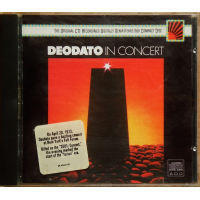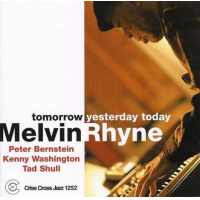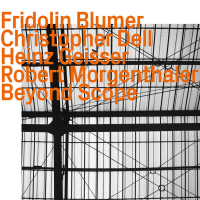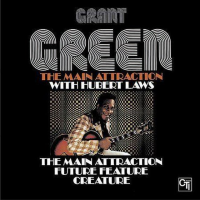Home » Jazz Articles » Liner Notes » Zvonimir Tot's Jazz Stringtet: Sarabande Blue
Zvonimir Tot's Jazz Stringtet: Sarabande Blue
That's the affect of Sarabande Blue—to replace irrelevant stylistic considerations with the pleasures of cohesive, elegant structures inspirited by group play and individual expression, written material and spontaneous composition interwoven. Zvonimir Tot and bassist Robert Kassinger—a Chicago Symphony Orchestra virtuoso, also possessing great jazz feel—improvise not simply over but organically emerging from entirely notated scores. Violinists Carmen Kassinger (the bassist's wife) and Lisa Fako, violist Cheryl Wilson and cellist Paula Kosower have attained a deceptively effortless sense of togetherness that enfolds and also unleashes the guitarist and bassist—imbuing the ensemble's sinuous textures and beguiling grooves with life. Sarabande Blue is a rare, indeed perhaps unique instance of finely detailed writing for unamplified strings along with inspired improvisation arriving at a warm, well-balanced blend. Happily, even without drums the music swings!
"I've always liked the sound of a string orchestra," Tot, whose advanced degrees and professorship at University of Illinois at Chicago have not muted the brio of his creative efforts at age 52, explains. "But somewhat strangely—or maybe not so strangely because I'm a jazz musician, maybe primarily so—I've always had a problem with string quartets.
"Obviously it's just my problem, because Haydn, Mozart and Beethoven didn't have one iota of a problem with the string quartet format. But to me, it always sounds like someone didn't make it to the gig: the bassist. To my ear, the bottom is missing. To hear in reality what I hear in my ear, I figured I'd have to make my own band. The idea for the string quintet plus me on acoustic guitar was to wed the harmonic interest of a string orchestra with the rhythmic agility of a chamber ensemble." More easily said than done, yet the results are instantly clear and inviting.
Tot has revisited and substantially revised seven of his original compositions from previous releases, where he played them with conventional jazz combo instrumentation, and also unveils three new pieces ("Aneri—Lament," "Fuga Longa, Vita Brevis," "Brother Nicolau") here. Playing unamplified nylon and steel Taylor guitars in the moment, with lyrical gusto and soulful inflections, he is equally focused on the prepared aspects of his music, the settings he's charted.
For instance, "Groove Me Wah" may be a simply AABA blues-funk riff, but Tot took pains to make sure none of the six "A" sections are the same. In "Aneri-Lament" he aimed for sonic colors like those evoked by film composer Ennio Morricone, who he describes as "one of my non-jazz herroes." The title track "Sarabande Blue" was originally commissioned by classical violinist Stefan Milenkovich as a violin-guitar-bass piece in which the lead violin line is completely composed. This version preserves its trio origin, adding a through-composed cello passage, subtle violin backing to Tot's achingly romantic while improv, and sprightly lift to the song's third section, emphasizing the rhythmic flourish characteristic of the sarabande form that rendered it, in the 16th and 17th centuries, scandalous.
"Bruce's Dilemma" resolves a problem faced by a Lutheran pastor and jazz bassist—a friend of Tot's—whose bishop told him to "quit moonlighting" by deftly melding the church hymn "Divinum Mysterium" ("Of the Father's Love Begotten") with an irresistible jazz-funk theme. "Maki (Guts and Glory") juxtaposes aggressive and reflective passages in its portrait of Bogoljub "Maki" Arsenijevi, a fresco painter who defied the Serbian dictatorship of the late 1990s. The bossa nova "Brother Nicolau" similarly contrasts introspective and energetic impulses. Tot gives "Fuga Longa, Vita Brevis," the Croatian folk song "Voda Zvira," "Blue Quest" and "Fugue for Mr. N.P." (dedicated to his late mentor, Russian composer Nikola Petin) diverse harmonic and contrapuntal variations that distinguish these forays into established precincts.
In all, the repertoire reflects Tot's desire to be "not revolutionary, but distinctive." He has earned his distinction and created his art through hard work pursued during difficult times, having been a desultory student until he discovered Mexican and other Latin American music, then Brazilian bossa nova in Yugoslavia just prior to the war that dissolved that republic. Having gained a good foundation in basic theory, ear training and harmony in a specialized music high school, the young guitarist escaped the violence of his native land, first for Budapest (where he was encouraged by guitarist Gyula Babos), then Amsterdam and Hanover, Germany. He arrived in the U.S. in 2000.
"I didn't get into jazz through the usual route kids take, through blues and rock," he says, and yet jazz, with its emphasis on a personal take and rhythmic propulsion is where he's arrived, as though destined. Tot's specific history and his nature, which evidently includes strong streaks of inquisitiveness, perceptibility and determination, stamps his music with his individuality. Precedents for an all-strings-with-guitar, no-drums sextet seem to be limited to Gene Bertoncini's Concerti (he plays mostly standards) and Jim Hall (on an electric ax) performing John Lewis's "Piece for Guitar and Strings" on the Third Stream classic Jazz Abstractions—neither of those projects, excellent though they are, is really akin to this one, which its creator describes as a step but not an end point.
"In my next project I'll use the three things I know something about," Zvonimir Tot forsees: "Balkan music, jazz and classical." We await that eagerly while absorbing the contrasting, cohesive aspects of Sarabande Blue.
Liner Notes copyright © 2026 Howard Mandel.
Sarabande Blue can be purchased here.
Contact Howard Mandel at All About Jazz.
Howard is a Chicago-born writer, editor, author, arts reporter for National Public Radio, consultant and videographer. Visit Howard at howardmandel.com.
Track Listing
Groove Me Wah; Aneri - Lament; Sarabande Blue; Fuga Longa, Vita Brevis; Bruce's Dilemma; Voda Zvira; Blue Quest; Maki (Guts & Glory); Fugue For Mr. N.P; Brother Nicolau.
Personnel
Zvonimir Tot
guitarCarmen Kassinger
violinLisa Fako
violinCheryl Wilson
violaPaula Kosower
celloRob Kassinger
bassAlbum information
Title: Sarabande Blue | Year Released: 2021 | Record Label: Groove Art Records
Tags
PREVIOUS / NEXT
Support All About Jazz
 All About Jazz has been a pillar of jazz since 1995, championing it as an art form and, more importantly, supporting the musicians who make it. Our enduring commitment has made "AAJ" one of the most culturally important websites of its kind, read by hundreds of thousands of fans, musicians and industry figures every month.
All About Jazz has been a pillar of jazz since 1995, championing it as an art form and, more importantly, supporting the musicians who make it. Our enduring commitment has made "AAJ" one of the most culturally important websites of its kind, read by hundreds of thousands of fans, musicians and industry figures every month.




















